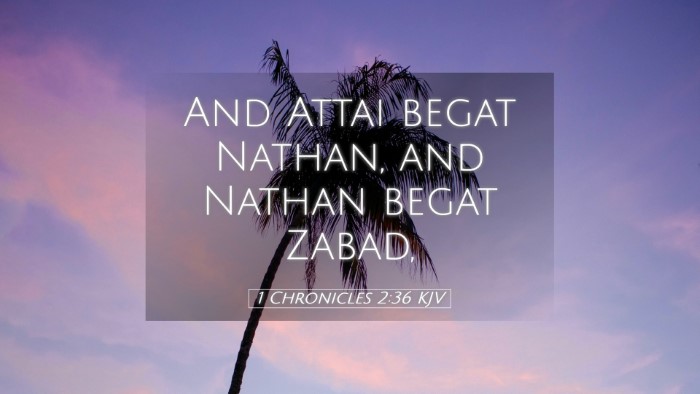Commentary on 1 Chronicles 2:36
Verse: 1 Chronicles 2:36 - "And the sons of Jerahmeel the firstborn of Hezron were, Ram the firstborn, and Bunah, and Oren, and Ozem, and Ahijah."
Introduction
The genealogical record in 1 Chronicles serves as a vital link between the Israelites' past and their present reality. The chapter imparts insights into family structures, tribal identities, and the legacy of biblical figures. In this context, verse 36 specifically mentions Jerahmeel, the firstborn of Hezron, and his descendants, offering a glimpse into the family line that shaped the early Israelite society.
Interpretation and Insights
General Observations
The listing in this verse reflects the importance of lineage and heritage in ancient Israel. Genealogies were not merely records for historical accuracy; they served broader theological and sociopolitical purposes. Commentators like Matthew Henry emphasize the significance of knowing one's ancestry as a means of affirming one’s identity and place within God’s covenant community.
Jerahmeel's Role
Albert Barnes comments on Jerahmeel’s placement as the firstborn of Hezron, noting this designation was crucial for leadership and inheritance purposes. The prominence of the firstborn in biblical culture typically conferred greater rights and responsibilities. The sons of Jerahmeel mentioned here were not just individuals but representatives of a family line that maintained ties to divine promises articulated throughout Israel’s history.
The Sons of Jerahmeel
- Ram: As the firstborn, Ram is positioned as a figure of leadership within the family. In Hebrew culture, the firstborn would often assume a role of authority and responsibility, which is underscored in other biblical texts where firstborn sons inherit blessings and responsibilities (Genesis 49:3).
- Bunah: His name suggests a connection to wisdom or understanding, aligning with the significance of leadership derived from knowledge in the Old Testament.
- Oren, Ozem, and Ahijah: These names, while less noted in biblical texts, encapsulate the diversity of roles each family member might play within their lineage. Their inclusion emphasizes God's intricate plan in establishing a community where different abilities and giftings come together.
Theological Implications
This verse serves to remind readers of how God knits together histories through family lines. The mention of specific names resonates with individuals in covenantal relationships with God. The chronicler makes a striking assertion about God's engagement in structuring and guiding families within His redemptive history, as noted by Adam Clarke.
Continuity of God’s Plan
The emphasis on genealogies throughout 1 Chronicles reminds us that God’s promises extend beyond individual relationships to encompass entire familial and tribal groups. Matthew Henry asserts that these detailed records testify to God’s faithful preservation of His people throughout generations. Each individual mentioned, while perhaps seemingly insignificant, plays a role in the grand narrative of redemption.
Lessons for Modern Believers
For pastors, theologians, and students alike, the introspection prompted by genealogical lists challenges them to consider their own spiritual heritage. Much like the descendants of Jerahmeel, contemporary believers are part of a larger family of God. This shared lineage calls for a recognition of both personal and collective responsibility within the Church.
Conclusion
The message of 1 Chronicles 2:36 extends beyond historical recounting. It invites readers to appreciate the value of their spiritual heritage and the continual unfolding of God's purposes through generations. Each name in this genealogy serves as a thread in the greater tapestry of God's design, reminding us of the continuity and fidelity of divine promises.
These reflections should inspire not only a deeper understanding of biblical chronology but also a renewed commitment to living out the faith inherited through generations.


